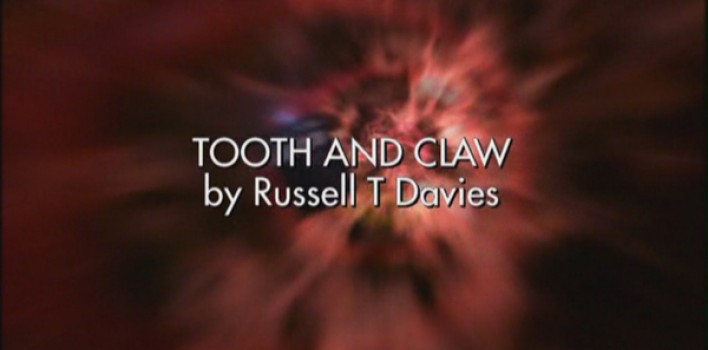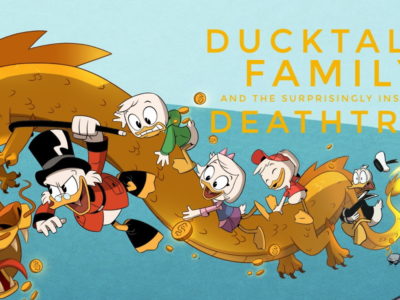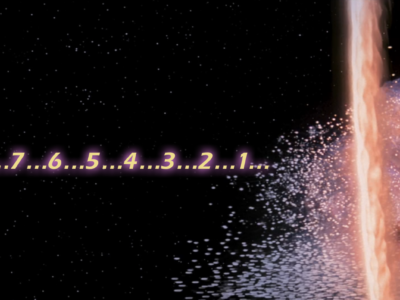Who-ology| S02E02 Tooth and Claw
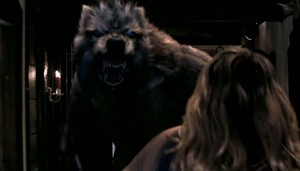 Doctor Who is no stranger to horror, and here it dives into a story that includes one of the most iconic monsters of the genre: the werewolf, although with a gorgeous sci-fi twist. As horror often does, the setting of this episode compels us to consider our position towards the supernatural and likely, to reevaluate it.
Doctor Who is no stranger to horror, and here it dives into a story that includes one of the most iconic monsters of the genre: the werewolf, although with a gorgeous sci-fi twist. As horror often does, the setting of this episode compels us to consider our position towards the supernatural and likely, to reevaluate it.
Our characters—principally Queen Victoria and her entourage as well as the Doctor and Rose—find themselves as guests at the Torchwood estate. Here, conversation is dominated by a local tale about an unnatural wolf that tears animals apart and abducts children. As we’ve been shown in the very first scenes of the episode, this is not merely a story, but a terrifying reality. There is a creature, come to Earth long ago, that has been cultivating its life and strength through the bodies and souls of one unfortunate child after another. It is now strong enough to reveal itself, and aims to pass into Queen Victoria to take over the monarchy and assert itself into a position of power in the world.
Over the course of the episode, we are exposed to a variety of postures towards the spiritual world and watch as the consequences of those positions unfold.
At first, Queen Victoria is intrigued by the story of the wolf. Her position is likely familiar to many people who find themselves drawn to the horror genre, and she articulates it well:
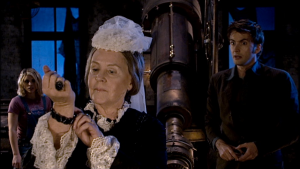 Victoria: “And that’s the charm of a ghost story, isn’t it? Not the scares and chills, that’s just for children, but the hope of some contact with the great beyond. We all want some message from that place. It’s the Creator’s greatest mystery that we’re allowed no such consolation. The dead stay silent, and we must wait.”
Victoria: “And that’s the charm of a ghost story, isn’t it? Not the scares and chills, that’s just for children, but the hope of some contact with the great beyond. We all want some message from that place. It’s the Creator’s greatest mystery that we’re allowed no such consolation. The dead stay silent, and we must wait.”
Queen Victoria comes from a place of longing to be reunited, or at least in contact again, with her deceased love. She seeks connection to something beyond her world, hoping she will find Prince Albert there. But when it turns out that the story is true and its consequences are danger, even death, she very much wants to shut the door that she once wished open. Though she has no power to do so, she demands:
Victoria: “I’ll not have it. No, sir. Not you, not that that thing, none of it. This is not my world.”
No amount of closing her eyes or wishing it were not true is going to make it so. In her fear, she becomes a terrified bystander who offers nothing in the battle against evil. She is merely a victim.
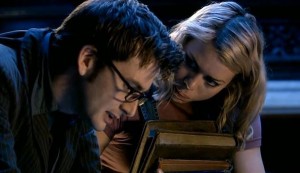 The Doctor and Rose are uniquely characterized in this episode. They are equally intrigued by the story of the wolf, but for the most part maintain an almost amused fascination with events as they unfold—even while people around them are being viciously ripped to shreds. They already believe in the world beyond Earth. They experience it daily. But we find them without a sense of respect for the supernatural and its power. We’ve not quite seen them in this way—not together. The Doctor is often able to be unattached, clinical, and insensitive, but his companion generally brings him back to reality. In this case, the two of them are more focused on one another than on the event or people at hand. They are on the brink of losing their own lives before they become serious about combating the evil they face. Though they are able to recognize its danger, they also find themselves drawn to it with fascination, almost affinity. This nearly hinders them from protecting themselves against it and in the process, lives are lost.
The Doctor and Rose are uniquely characterized in this episode. They are equally intrigued by the story of the wolf, but for the most part maintain an almost amused fascination with events as they unfold—even while people around them are being viciously ripped to shreds. They already believe in the world beyond Earth. They experience it daily. But we find them without a sense of respect for the supernatural and its power. We’ve not quite seen them in this way—not together. The Doctor is often able to be unattached, clinical, and insensitive, but his companion generally brings him back to reality. In this case, the two of them are more focused on one another than on the event or people at hand. They are on the brink of losing their own lives before they become serious about combating the evil they face. Though they are able to recognize its danger, they also find themselves drawn to it with fascination, almost affinity. This nearly hinders them from protecting themselves against it and in the process, lives are lost.
There is another perspective, significantly different from all the others, represented by the Brethren i.e.: local monks who know kung-fu (just go with it). They not only believe in the wolf, but they have become so drawn into its influence and power that they have abandoned their call to God and now worship the wolf instead, serving it and its dark purposes. They force those at Torchwood into bondage, assisting the wolf towards its purpose and resulting in the brutal death of many—even of their own Order.
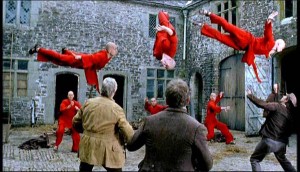 The Bible affirms over and over again the existence of a spiritual world that, though unseen, nevertheless has great power and influence over the seen world. We see this in Old and New Testament stories of demons, sorcery, possession, sickness, death. There is a huge element of light in the spiritual world, juxtaposed by a darkness that exists whether or not we choose to acknowledge or believe in it—it possess a power that we would be unwise not to recognize and respect.
The Bible affirms over and over again the existence of a spiritual world that, though unseen, nevertheless has great power and influence over the seen world. We see this in Old and New Testament stories of demons, sorcery, possession, sickness, death. There is a huge element of light in the spiritual world, juxtaposed by a darkness that exists whether or not we choose to acknowledge or believe in it—it possess a power that we would be unwise not to recognize and respect.
The horror genre is unique in its ability to bring this reality to our minds and force us to face our posture towards it. We may find ourselves experiencing fear of the darkness we acknowledge. In some ways this is very healthy. But that fear does not have to own us. We have a power on our side that allows us to face evil with strength—not disbelieving or flippant, but honest and unafraid. How can this be a reality?
We believe in a King who created and reigns over the entirety of the spiritual world, and who has drawn us under his banner, where we find protection and ultimately, victory. Although living in this world, our story includes brokenness—where darkness often feels stronger than light—the presence of evil does not preclude the existence of the light and goodness of God. In fact, our victory over darkness is assured at the end of our journey. Jesus proves that we have someone strong on our side, who understands our fight and does battle in the spiritual realm for us: he came to Earth to walk in the darkness with us. He, the physical picture of a spiritual reality, was exposed to the horrifying elements that we face. And we watched as he overcame darkness, even death.
As we are told in1 Corinthians 15: 50-56, When the perishable puts on the imperishable, and the mortal puts on immortality, then shall come to pass the saying that is written: “Death is swallowed up in victory.” “O death, where is your victory? O death, where is your sting?”
The sting of death is sin, and the power of sin is the law.
But thanks be to God, who gives us the victory through our Lord Jesus Christ.


